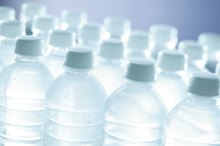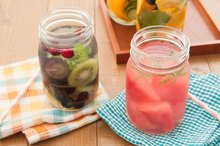What does fact checked mean?
At Healthfully, we strive to deliver objective content that is accurate and up-to-date. Our team periodically reviews articles in order to ensure content quality. The sources cited below consist of evidence from peer-reviewed journals, prominent medical organizations, academic associations, and government data.
The information contained on this site is for informational purposes only, and should not be used as a substitute for the advice of a professional health care provider. Please check with the appropriate physician regarding health questions and concerns. Although we strive to deliver accurate and up-to-date information, no guarantee to that effect is made.
The Carbohydrates in Cucumber Juice
Like vitamins and minerals, water is essential for good health. It is found in every cell, organ and tissue in your body. You may find water too boring to drink, so to stay hydrated, reach for beverages loaded with calories and carbohydrates. If you're looking for a lower-calorie and low-carb juice that does not contain sugar substitutes, consider giving cucumber juice a try.
Cucumber
Cucumbers originated in India, and came to North America in the 16th century. Cucumbers are a summer vegetable and a member of the same family as squash and watermelon. They are low in calories and can help you meet your daily vitamin C and vitamin A needs. The low-calorie content of the cucumber is due to its high water content. A 4 oz. serving of cucumbers contains 2 oz. of fluid, which is why the cucumber makes a good juice choice.
- Cucumbers originated in India, and came to North America in the 16th century.
- The low-calorie content of the cucumber is due to its high water content.
Carbohydrates Cucumber Juice
How to Make Grapefruit Juice Taste Better
Learn More
Just like the cucumber itself, cucumber juice is a low-calorie juice, and very low in carbohydrates. A 1/2-cup serving of homemade cucumber juice contains 34 calories and 2 g of carbohydrates 1. Cucumber juice is significantly lower in carbohydrates than other vegetable juices. By comparison, a 1/2-cup serving of various mixed vegetable juices contains 5 to 8 g of carbohydrates, and 1/2-cup serving of carrot juice contains 7 g of carbohydrates.
- Just like the cucumber itself, cucumber juice is a low-calorie juice, and very low in carbohydrates.
Daily Carbohydrate Needs
Like water, carbohydrates are also an essential nutrient. They provide your body with its preferred source of energy, and are the nutrients your body needs in the largest amount. A healthy and balanced diet should get 45 to 65 percent of its calories from carbohydrates. On a 2,000-calorie diet that means about 225 to 325 g of carbohydrates a day. Most of your carbohydrates should come from healthy sources, such as fruits, vegetables, whole grains and beans. While the cucumber juice makes a healthy carbohydrate choice, it is not a significant source of carbohydrates.
- Like water, carbohydrates are also an essential nutrient.
- While the cucumber juice makes a healthy carbohydrate choice, it is not a significant source of carbohydrates.
Making Cucumber Juice
The Calories in a Yogurt & Fruit Smoothie
Learn More
Cucumber juice is easy to make 12. Simply puree peeled cucumbers with water and ice and enjoy. You can add other ingredients for flavor such as ginger, mint or lemon, without adding calories or carbs. If you don't like pulpy juice, you can strain it through a cheese cloth. Some cucumber juice recipes also use sugar 12. But adding sugar will increase the calorie and carbohydrate content of the juice.
Related Articles
References
- My Fitness Pal: Calories in Homemade Cucumber Juice
- Vegweb.com; Cucumber Juice; Dawn Barrow
- National Center for Complementary and Integrative Health. Glucosamine/Chondroitin Arthritis Intervention Trial (GAIT): Primary and Ancillary Study Results. Bethesda, Maryland; September 24, 2017.
- Khotimchenko Y. Pharmacological Potential of Sea Cucumbers. Int J Mol Sci. 2018 May;19(5):1342. doi:10.3390/ijms19051342.
- National Center for Complementary and Integrative Health. Traditional Chinese Medicine: What You Need To Know. Bethesda, Maryland; updated April 29, 2019.
- Olivera-Castillo L, Davalos A, Grant G, et al. Diets containing sea cucumber (Isostichopus badionotus) meals are hypocholesterolemic in young rats. PLoS One. 2013 Nov 19;8(11):e79446. doi:10.1371/journal.pone.0079446.
- Roginsky AB, Ding XZ, Woodward C, et al. Anti-pancreatic cancer effects of a polar extract from the edible sea cucumber, Cucumaria frondosa. Pancreas. 2010 Jul;39(5):646-52. doi:10.1097/MPA.0b013e3181c72baf.
- Sadegh VM, Ebrahimpour A, Abdul-Hamid A, et al. Angiotensin-I Converting Enzyme (ACE) Inhibitory and Anti-Hypertensive Effect of Protein Hydrolysate from Actinopyga lecanora (Sea Cucumber) in Rats. Mar Drugs. 2016 Sep 30;14(10); E176. doi:10.3390/md14100176.
- Yano A, Abe A, Aizawa, F. et al. The Effect of Eating Sea Cucumber Jelly on Candida Load in the Oral Cavity of Elderly Individuals in a Nursing Home. Mar Drugs. 2013;11(12):4993-5007. doi:10.3390/md11124993.
Resources
- "The Complete Book of Food Counts"; Corinne T. Netzer; 2009
- Food Network; Mean Green Cucumber Juice; Sunny Anderson; 2008
Writer Bio
Jill Corleone is a registered dietitian and health coach who has been writing and lecturing on diet and health for more than 15 years. Her work has been featured on the Huffington Post, Diabetes Self-Management and in the book "Noninvasive Mechanical Ventilation," edited by John R. Bach, M.D. Corleone holds a Bachelor of Science in nutrition.









